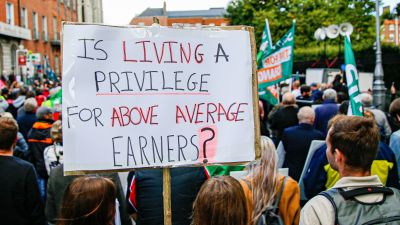Exclusive
The big rent squeeze in England forecast to continue for two years

The rent squeeze is set to continue despite years of soaring price increases, as ITV News Business and Economics Editor Joel Hills reports
The cost of renting a home from a private landlord in the UK has surged at its fastest pace for 50 years.
But while general inflation has eased significantly in the last few months, rent inflation may be set to remain at a painfully high level.
Generation Rent thinks the big rent squeeze is far from over, it forecasts that average rents in England will rise by 8.5% between now and the end of 2025.
Economist and Generation Rent campaigner Ian Mulheirn says rent rises aren't being driven by higher mortgage rates.
“Rent rises aren’t primarily coming from higher interest rates, rent rises are being driven by rapidly rising earnings” explains Ian Mulheirn, a former Treasury economist and Chair of Generation Rent.
“Landlords will always raise the rent to what the market will bear," he said, "and, right now, they’re able to charge increasing amounts, because for some workers we’re seeing quite rapid wage growth at the moment and that's allowing rents to go up.”
Mulheirn’s forecast model (shown in orange below) assumes the historically strong relationship between rates of pay and rent growth continues and uses the latest projections for pay, published by the Office for Budget Responsibility last month.
It also uses the Office for Budget Responsibility's projections for population growth and assumes that 230,000 new homes are created each year (the average number of annual “net additions” over the last five years).
The model has predicted the evolution of rents accurately since 2010.
“Rents will keep rising,” Mulheirn says. “We're about halfway through the jump in the price level that we can expect to see over the coming months and that's because it takes some time for rents to rise in response to rising wages.”
Around one in five households are in the private rental sector. Renters tend to be younger and on lower incomes than homeowners.
For the average person, rents rising broadly in line with incomes is unlikely impacting affordability but for those who rely on benefits or work, in parts of the economy where pay growth has been low (the public sector, retail, hospitality or construction), it is likely to prove painful.
'There’s going to be a lot of rough justice between different tenants,' Ian Mulheirn says
“There’s going to be a lot of rough justice between different tenants,” Mulheirn told ITV News.
“This will cause hardship for hundreds of thousands of families. In some cases, it will cause evictions and homelessness. And even for those who aren't in hardship, it will mean they will have to carve out an awful lot of money from relatively meager benefits in order to fund their rent.”
In his Autumn Statement, the chancellor increased Local Housing Allowance (LHA) rates - a cap on housing benefit for private tenants - to 30% of local rents from April 2024. Thereafter it is frozen again.
The new level of support means 1.6 million households will gain to the tune of almost £800 a year on average.
But LHA rates have been frozen since April 2020 and during this period, private rents have sky-rocketed. The Institute for Fiscal Studies estimates that as little as 5% of newly listed properties on Zoopla can now be covered by housing benefit.
The Joseph Rowntree Foundation, and other charities, blame the freezing of the LHA for an increase in both homelessness and rates of poverty, as people have to find more money out of their other sources of income.
If Generation Rent’s forecast comes to pass, then by the Autumn of 2025 average rents will be 14% higher than the reference rents used to determine the April 2024 LHA rates.
“Unfortunately, the Chancellor, despite the generosity of the measures coming in next April, the Chancellor hasn't solved the problem of unaffordable rents for people who are relying on benefits,” say Mulheirn.
“We expect that affordability will rapidly fall back down to where it is today, within about 18 months of the increase taking effect."
Generation Rent wants the government to permanently link LHA rates and 30 percentile for local rents so taxpayer support rises along with housing costs.
In a statement, a government spokesperson said: “Our increase to the Local Housing Allowance rate means that 1.6 million private renters on Housing Benefit or Universal Credit will gain an average of nearly £800 a year to ease costs.
“In addition to this we’ve also invested over £30 billion in housing support this year, while our Discretionary Housing Payments provide a safety net for anyone struggling to meet their rent or housing costs.”
Want a quick and expert briefing on the biggest news stories? Listen to our latest podcasts to find out What You Need To Know...